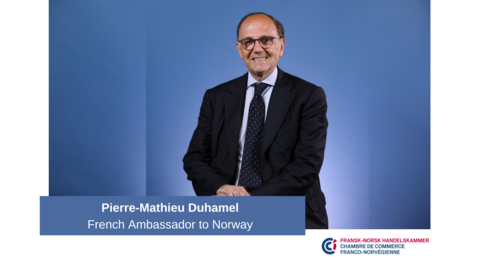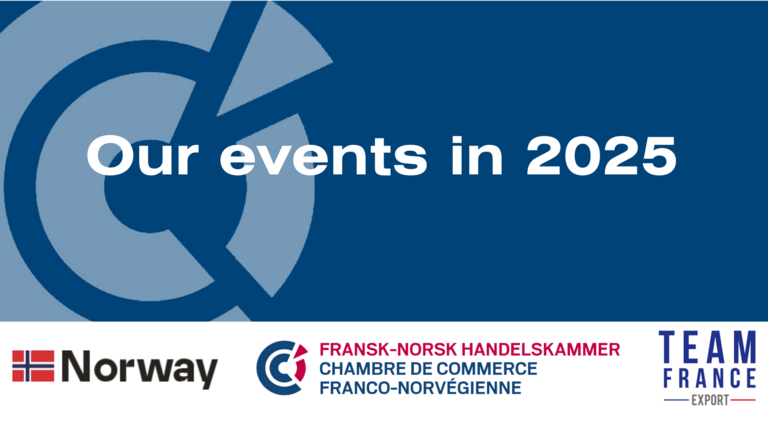Intervju
"The Norwegian and French economies display a high level of complementarity"

The CCFN opens its doors to the French Ambassador to Norway, H.E. Pierre Mathieu Duhamel.
Since your arrival in March 2019, how have your views on Norway and the bilateral economic cooperation between France and Norway changed?
Upon my arrival, I was stunned by the dynamics of our bilateral economic relationship. It is spanning a wide spectrum of sectors and companies from SMEs to global groups. In the context of the pandemics, the acceleration of our trade has unsurprisingly stopped, but 2020 has confirmed the rebalancing trend of our exchanges. The Norwegian and French economies display a high level of complementarity. France imports oil and gas from the Norwegian continental shelf as well as fish and seafood whereas Norway primarily imports machines, electrical components, electronics and, above all, transportation means.
France is indeed an important supplier of the Norwegian offshore sector, both for goods and services.
Beside trade, at a financial level, Norway is a significant investor in France whereas French banks, for decades, have been ranking among the main financiers of Norwegian companies and Oslo Børs is now integrated into the pan-European stock market group Euronext.
The French government has launched a very strong recovery plan with ambitious climate goals to deal with Covid. Could you please tell us more about the stakes of this plan and the new opportunities for bilateral cooperation that the plan could generate in terms of ecologic transition and industrial cooperation?
France's ambition is to stay at the forefront of the fight against climate change. Its recovery plan puts indeed a strong emphasis on environmental transition. No less than 30 Bn EUR (corresponding to more than 300 bn NOK) are earmarked to accelerate such a transition. A particular focus is put on industry decarbonation, green efficiency of buildings and, of course, the development of green mobility transition and green energies. The plan also encompasses measures dedicated to the preservation of global biodiversity, agricultural soils and, more generally, agricultural transition.
Overall, through all these measures, the plan is expected to generate an aggregate reduction in emissions of 57 M t CO².
These priorities are largely convergent with those of Norway, as recently presented in its climate plan.
I see numerous cooperation avenues, in particular as regard the decarbonation of industry, both through green hydrogen and CCS, green mobility and green energies.
France has made big progress in terms of attractiveness under the leadership of President Macron. What message would you like to pass on to representatives of Norwegian companies who could be interested in establishing a company in France?
Within the last three years, France has accelerated its pace of structural reforms. A far-reaching tax reform targeted at companies has considerably increased its attractiveness. And this is backed by tangible results. Since 2018, France has been consistently ranked first in Europe (including the UK) as regards the number of FDI projects.
There is also a general feeling that France has adequately tackled the challenges of the post-pandemics recovery. In its special Edition 2020 (“how countries are performing on the road to recovery”), the World Economic forum ranks France 10th out of the 37th countries reviewed, immediately behind Germany (9th) and ahead of, inter alia, Switzerland (12th), the US (13th) or the UK (16th).
At the heart of the Euro area, linking Northern and southern Europe, benefitting from outstanding infrastructures, France has a talented and highly productive workforce and is more business-friendly than ever.
It is also a gateway, not only to the Euro area and the European Union, but also to the whole African continent and to the Middle East.
The French Embassy to Norway, the Norwegian section of the “Conseillers du commerce extérieur de la France” and the Oslo office of the French-Norwegian Chamber of Commerce work together to promote and develop French companies in Norway and to reinforce the industrial ties between the two countries. What is your opinion on this cooperation and what are your expectations for the years to come?
In Norway, we are fortunate enough to benefit from a compact yet very motivated “France Export team”. Back to 2019, Norway has indeed been a pilot for the streamlining of our various institutions in charge of the support to French exporters abroad. Concretely, this means that the French Norwegian Chamber of Commerce is also representing Business France customers in Norway, creating a “one stop shopping” institution.
The advantage of such a solution is obvious in terms of visibility and clarity.
From the French corporate side, there has been a consistent interest in developing trade relations with Norway. Some important economic sectors, like the food and beverage may however continue to suffer from entry barriers. But the trade relationship is vibrant as regards machines and technologies.
I do hope the economic recovery we all expect after such a tense year will emphasize the tightness of our economic relationship and take it to the next level.



